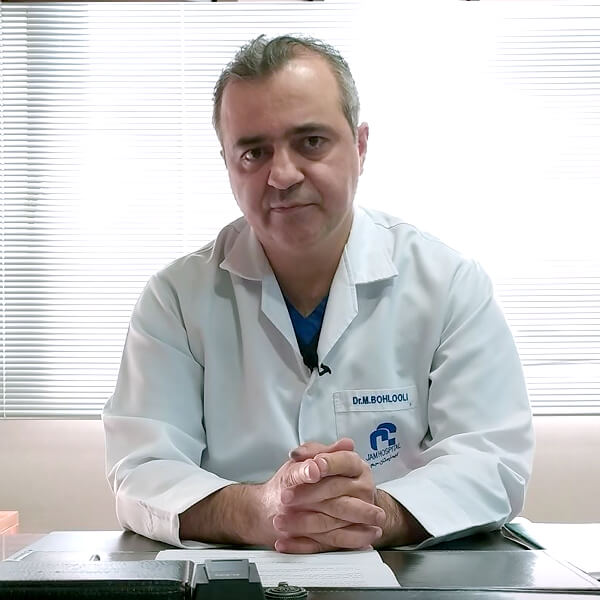Dr. Siamak Khaleghi
Subspecialist in Adult Gastroenterology and Hepatology – Internal Medicine Specialist
Speeches of Dr. Siamak Khaleghi, gastroenterology specialist, on World Hepatitis Day.
The text of Dr. Khaleghi‘s speech
Hello. I am Dr. Siamak Khalkhali, a specialist in internal medicine, gastroenterology, and a faculty member at Iran University of Medical Sciences, currently working at Jam Hospital. I am at your service regarding World Hepatitis Day, which takes place every year on July 28th. Our goal is to inform about the various types of viral hepatitis. We divide them into two groups. Hepatitis viruses type A and E are transmitted through contaminated food and water. And viral hepatitis B, C, D are transmitted through blood transfusion, blood products, contaminated needles, and sexual contact.
The group that is more important to us is hepatitis B, C and D. Hepatitis A and E viruses typically do not become chronic and do not have a progressive course. And they resolve by themselves without causing major problems. But hepatitis B, C, and D, which can become chronic, are of great importance. These can lead to long-term liver failure. And liver failure usually sets the stage for liver cancer. Including gastrointestinal bleeding, gastrointestinal infections, neurological disorders, and kidney disorders will follow. Hepatocellular carcinomas are also among the significant consequences that we can prevent by preventing hepatitis.
Hepatitis B can fortunately be prevented by vaccination. Universal vaccination for all individuals has been implemented over the past twenty years. And fortunately, the hepatitis statistics have been decreasing from the previously high levels of 3-4% in the community. And now, close to 2% of the population have chronic hepatitis B. With more vaccination, we can bring this statistic even lower. So our strong recommendation is to take vaccination seriously. In the group that did not receive the vaccine, it is essential to check for the presence of hepatitis B antigen, and if necessary, we recommend administering the vaccine again. In individuals who have more contact with blood products, patients with the disease, and contaminated environments, including healthcare workers, They should have regular and continuous screenings to determine whether their bodies are immune to hepatitis or not. By checking and measuring hepatitis B antibodies, we can easily determine this. If these levels are not sufficient, they can renew the vaccination to become immune.
Unfortunately, there is no suitable vaccine available for Hepatitis C. And the main issue is the prevention of Hepatitis C.
Sexual precautions, needle use, contamination through needles. Examination and correction of blood components that may be contaminated with this virus. Fortunately, blood products have been screened for many years during screening. And we are almost 100% confident that blood products are not contaminated with this virus. Injecting them will usually be harmless. However, the issue of transmission through sexual contact, injecting with contaminated needles, particularly in individuals with addiction, exists. These individuals should be monitored and examined. If hepatitis C is positive in these cases, they should undergo treatment.
The good news about hepatitis C is that it has a very high potential for treatment. Perhaps ten to fifteen years ago, our drug treatment was only 60-70% effective. But currently, taking oral medications for three months cures the disease in 99% of cases. So, we should take hepatitis seriously. Currently, the prevalence of hepatitis B in the community is about 2%, and hepatitis C is less than half a percent. This amount is not very high, but because they have a chronic course and often lead to liver failure, Timely diagnosis helps a lot in the treatment of the patient. The main issue is preventing the onset of the disease, which is achieved through vaccination and preventing the entry of organisms into the body And then rapid diagnosis followed by complete treatment can be beneficial. And with these methods, we can prevent liver failures and provide appropriate treatment for patients.




